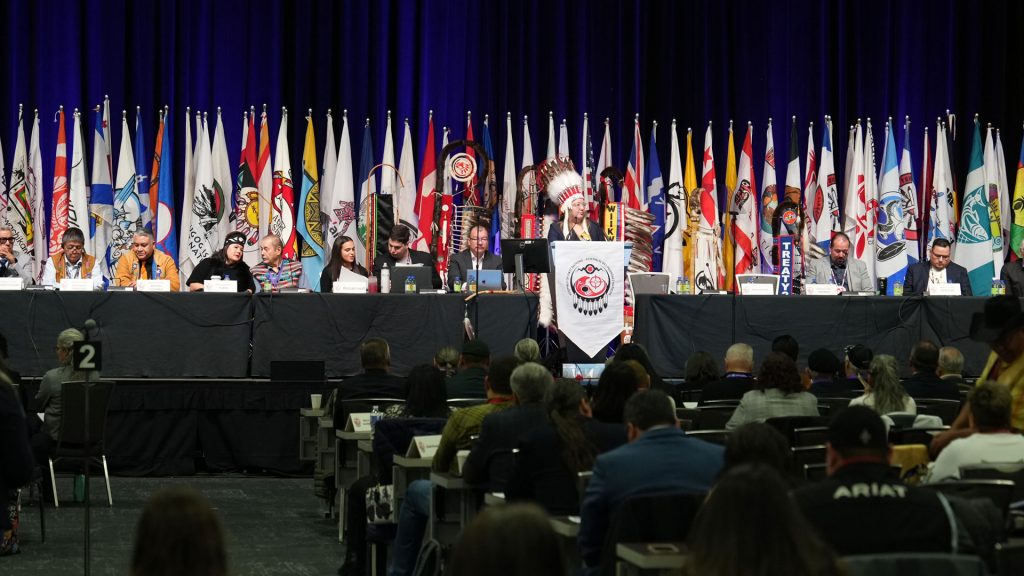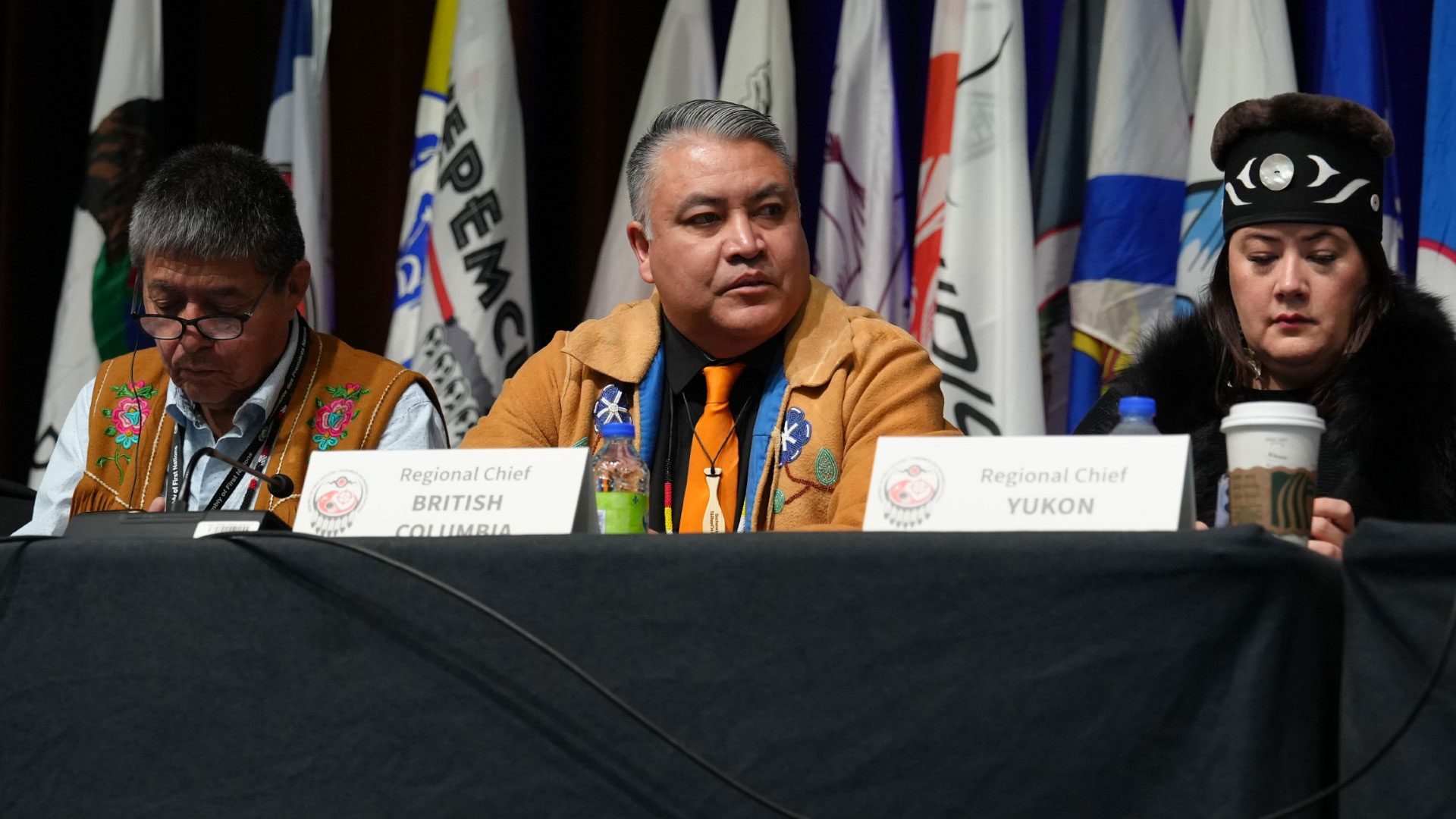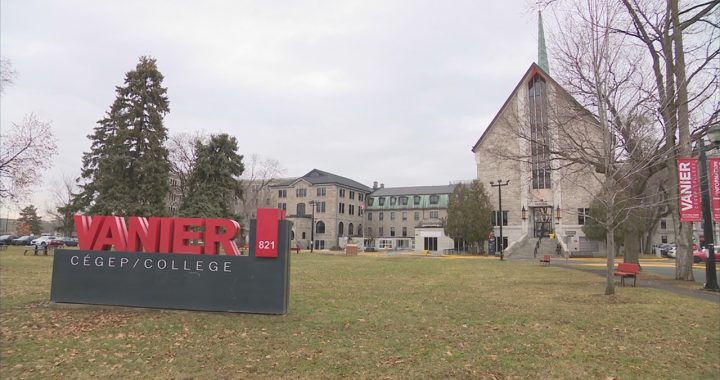
A policy analyst at the AFN raised questions about the validity of the resolutions on child welfare that saw the Final Settlement Agreement defeated. Photo: APTN.
The Assembly of First Nations took the “unusual” step of having a legal opinion written about two resolutions that passed at the special chiefs assembly on child welfare reform in Calgary, according to a memo obtained by APTN News.
An email that was sent to a small number of chiefs in November and shared with a board member of the First Nations Child and Family Caring Society (the Society) had some chiefs and advocates questioning the direction the AFN was taking in renegotiating what is known as the Final Settlement Agreement, or FSA.
National Chief Cindy Woodhouse Nepinak called on Canada to return to the negotiating table after 267 of the 414 chiefs at the Calgary gathering rejected the proposed $47.8 billion FSA. The FSA is an agreement to overhaul and reform the child welfare system on reserve across the country.
The resolutions under question were 60/2024 and 61/2024. One called for the AFN to turn down the deal, the second called for a new round of consultations. The second resolution also created a national Children’s Chiefs Commission to ensure any settlement agreement “does not abrogate or derogate from First Nations’ title rights, treaty rights or in any way limit or diminish Canada’s duty to consult, fiduciary obligations to First Nations or the honour of the Crown.”

Despite the national chief’s confirmation she would follow resolutions 60 and 61, at least one AFN staffer wrote an email questioning the validity of the two resolutions, stating there were “issues that complicate their implementation,” according to the memo.
The email was sent by AFN vice president, strategic policy analyst Amber Potts to movers and seconders of a new draft resolution about child welfare being voted on at the December gathering.
It is part of the AFN’s normal process to review resolutions to ensure they comply with the law and the AFN Charter before they are put to the floor of the assembly for a vote.
What is unusual was that Potts also raised questions about the validity of the earlier resolutions, 60 and 61, from the October meeting, which had already passed, formed the basis for the rejection of the FSA, and which are already being partly implemented.
A spokesperson at the AFN said that although resolutions 60/2024 and 61/2024 had been reviewed prior to passing at the Calgary meeting, the AFN took an extra step of conducting an external legal review of the resolutions before presenting them to the executive committee. The spokesperson but did not say why that extra step was deemed necessary.
The leaked memo contains advice from the law firm Aird & Berlis sought by Mary Teegee, who is a B.C. board representative of the First Nations Child and Family Caring Society because of those emails. APTN has not obtained the original chain of emails.
Cindy Blackstock, executive director of the Caring Society said the issue was that chiefs who were proposing new resolutions about child welfare at the current assembly, were building on resolutions 60 and 61, so if the original resolutions had any conflict with the AFN’s Charter, the new resolutions could be invalid.
“It’s very unusual to have this happen after the fact,” said Blacstock.
In the memo to Mary Teegee lawyers quote from the Nov. 22 email and state “Based on Ms. Potts’ Nov 22 e-mail, we understand that the AFN has obtained – but has not provided to the First Nations-in-Assembly – an external independent legal review of resolutions 60 and 61. Ms. Potts summarizes what appear to be conclusions from that legal opinion, but it was not attached to her e-mail and we have not otherwise been provided with a copy of the legal opinion.”
The lawyers proceed to infer, nevertheless, based on Ms. Potts’ email, that the AFN is concerned that revisions to the AFN Charter would be necessary to create the Chiefs’ Children’s Commission proposed in the October resolutions. She added that there is no money to support a new negotiating team, meaning the Children’s Chiefs Commission – which is already being staffed.
Mary Teegee ‘s lawyers reassured her that, in their opinion, there is no need to change the AFN’s Charter to support the Children’s Chiefs Commission.
Blackstock said she has seen other chiefs commissioning legal reviews as a result of the email’s allegation that the original resolutions may be somehow invalid.
“Those independent reviews, the ones I’ve seen, refute that, and say there are really these resolutions that can move, there’s no argument that it’s a contravention of the Charter,” said Blackstock.

Terry Teegee, the AFN’s regional chief for British Columbia, said he has also seen many legal opinions circulating about the resolutions, but he agreed, there is no violation of the AFN Charter. He said the two resolutions are valid.
“There are many precedents to frame Chief’s committees, there is a chief’s committee on Health, on Education, and they develop their own terms of reference,” said Terry Teegee.
He added it was unusual for the AFN to revisit resolutions 60 and 61, because they had already been through a validation process before they passed a vote.
“I understand the point and the concern about the timing (of AFN revisiting the resolutions),” he said. “If the vote on the implementation agreement had passed there would be no legal opinions circulating.”
Chiefs wanted to negotiate the FSA largely because of three perceived flaws: the financial commitments were uncertain because they needed to be reviewed annually by Canada, chiefs had little time to review the decision and the length of time the agreement covered.
In addition the deal would wipe out past, and hard won, tribunal orders. Instead there would be two bodies, a First Nations Dispute resolution tribunal that Blackstock calls toothless, because the body could not compel the government to spend money or change systems.
The second body was a non-Indigenous body, called the Reform Implementation Body which had more power, but would operate behind closed doors and was not First Nation-led.
Read More:
Resolution calls for AFN to ‘apologize’ publicly to First Nations child welfare agencies
The agreement came about after the Canadian Human Rights Tribunal found that Canada had “wilfully” and “recklessly” discriminated against First Nations children living on reserve and were involved in the child welfare system.
It ordered Canada to reform the system and pay compensation. Part of the reform came in the passing of C-92 which allowed each community to take over control of its child welfare system. The FSA would provide the money to reform how that care is provided.










